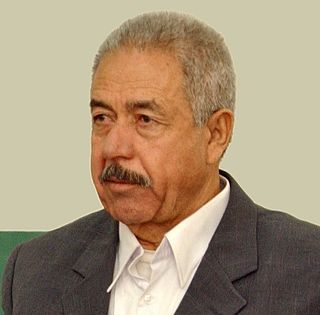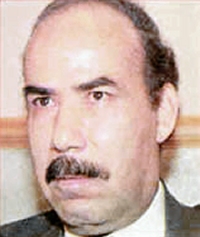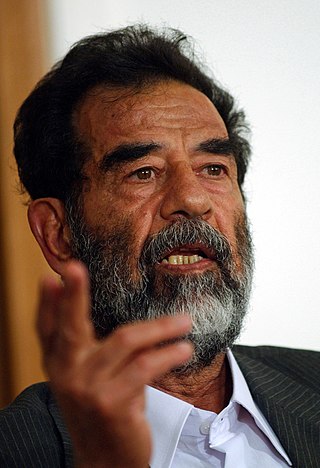
Tariq Aziz was an Iraqi politician who served as Deputy Prime Minister, Minister of Foreign Affairs and a close advisor of President Saddam Hussein. Their association began in the 1950s when both were activists for the then-banned Arab Socialist Ba'ath Party. He was both an Arab nationalist and a member of the Chaldean Catholic Church.

Iraq under the Arab Socialist Ba'ath Party saw severe violations of human rights. Secret police, state terrorism, torture, mass murder, genocide, ethnic cleansing, rape, deportations, extrajudicial killings, forced disappearances, assassinations, chemical warfare, and the destruction of the Mesopotamian marshes were some of the methods Saddam Hussein and the country's Ba'athist government used to maintain control. Saddam committed crimes of aggression during the Iran–Iraq War and the Gulf War, which violated the Charter of the United Nations. The total number of deaths and disappearances related to repression during this period is unknown, but is estimated to be at least 250,000 to 290,000 according to Human Rights Watch, with the great majority of those occurring as a result of the Anfal genocide in 1988 and the suppression of the uprisings in Iraq in 1991. Human Rights Watch and Amnesty International issued regular reports of widespread imprisonment and torture.

Ali Hassan Majid al-Tikriti, nicknamed Chemical Ali, was an Iraqi politician and military commander under Saddam Hussein who served as defence minister, interior minister, and chief of the Iraqi Intelligence Service. He was also the governor of Kuwait during much of the 1990–91 Gulf War.
The Halabja massacre, also known as the Halabja chemical attack, was a massacre of Kurdish people that took place on 16 March 1988, during the Iraqi–Kurdish conflict in the closing days of the Iran–Iraq War in Halabja, Kurdistan, Iraq. The attack was part of the Al-Anfal Campaign in Kurdistan, as well as part of the Iraqi Army's attempt to repel the Iranian Operation Zafar 7. It took place 48 hours after the capture of the town by the Iranian Army. A United Nations (UN) medical investigation concluded that mustard gas was used in the attack, along with unidentified nerve agents.

Barzan Ibrahim Hassan al-Tikriti, also known as Barazan Ibrahim al-Tikriti, Barasan Ibrahem Alhassen and Barzan Hassan, was one of three half-brothers of Saddam Hussein, and a leader of the Mukhabarat, the Iraqi intelligence service. Despite falling out of favour with Saddam at one time, he was believed to have been a close presidential adviser at the time of his capture by U.S. forces. On 15 January 2007, Barzan was hanged for crimes against humanity. He was decapitated by the hangman's rope after errors were made calculating his body weight and length of drop from the platform.

The Anfal campaign was a counterinsurgency operation which was carried out by Ba'athist Iraq from February to September 1988 during the Iraqi–Kurdish conflict at the end of the Iran–Iraq War. The campaign targeted rural Kurds because its purpose was to eliminate Kurdish rebel groups and Arabize strategic parts of the Kirkuk Governorate. The Iraqis committed atrocities on the local Kurdish population, mostly civilians.

Lieutenant General Abid Al-Hamid Mahmud al-Tikriti was an Iraqi military officer and Saddam Hussein's personal secretary.

The trial of Saddam Hussein was the trial of the deposed President of Iraq Saddam Hussein by the Iraqi Interim Government for crimes against humanity during his time in office.

Awad Hamad al-Bandar (Arabic: عواد حمد البندر السعدون, romanized: ʿAwād Ḥamad al-Bandar al-Saʿdūn; was an Iraqi chief judge under Saddam Hussein's presidency. He was a member of the Arab Socialist Ba'ath Party and was the head of the Revolutionary Court which issued death sentences against 143 Dujail residents, in the aftermath of the failed assassination attempt on the president on 8 July 1982.

Rizgar Mohammed Amin is the former chief judge of the Iraqi Special Tribunal's Al-Dujail trial. He is the only judge whose name was revealed on the trial's opening on 19 October 2005, the names of the other four judges and all but two of his four colleagues faces not allowed to be shown during the televised portions of the trial.(Telegraph.co.uk – 12:30AM GMT 15 January 2006)

Rauf Rashid Abd al-Rahman is the replacement chief judge of the Al-Dujail trial of Saddam Hussein in 2006, when he sentenced Saddam and some of his top aides to death by hanging.
Capital punishment in Iraq is a legal penalty. It was commonly used by the government of Saddam Hussein, was temporarily halted after the US-led 2003 invasion of Iraq that deposed Hussein, and has since been reinstated. Executions are carried out by hanging.

The execution of former Iraqi president Saddam Hussein took place on 30 December 2006. Saddam was sentenced to death by hanging, after being convicted of crimes against humanity by the Iraqi Special Tribunal for the Dujail massacre—the killing of 148 Iraqi Shi'ites in the town of Dujail—in 1982, in retaliation for an assassination attempt against him.
The Dujail massacre was a mass killing of Shia rebels by the Ba'athist Iraqi government on 8 July 1982 in Dujail, Iraq. The massacre was committed in retaliation to an earlier assassination attempt by the Shia Iranian supported Islamic Dawa Party against the then President of Iraq, Saddam Hussein. The town of Dujail had a large Shia population, with 75,000 residents at the time of the incident, and was a well-known stronghold of the Dawa Party. It is located approximately 53 km (33 mi) from the capital of Baghdad, in the Sunni-majority Saladin Governorate of Iraq.
The 1999 Shia uprising in Iraq or Second Sadr Uprising was a short period of unrest in Iraq in early 1999 following the killing of Muhammad al-Sadr by the then Ba'athist government of Iraq. The protests and ensuing violence were strongest in the heavily Shia neighborhoods of Baghdad, as well as southern majority Shiite cities such as Karbala, Nasiriyah, Kufa, Najaf, and Basra.

Hussein Rashid Mohammed al-Tikriti is a former Iraqi military commander, who formerly served as the General Secretary of the General Command of the Armed Forces of Iraq.

Feylis, also known as Feyli Kurds, is a Kurdish tribe mainly from Baghdad and the borderlands between Iraq and Iran. They speak Feyli which is classified as a sub-dialect of Southern Kurdish, but is commonly mistaken as being identical with the separate Feyli dialect of Northern Luri. Linguist Ismaïl Kamandâr Fattah argues that the Kurdish Feyli dialect and other Southern Kurdish sub-dialects are 'interrelated and largely mutually intelligible.'
Reactions to the execution of Saddam Hussein were varied. Some strongly supported the execution, particularly those personally affected by Saddam's actions as leader. Some of these victims wished to see him brought to trial for his other actions, alleged to have resulted in a much greater number of deaths than those for which he was convicted. Some believed the execution would boost morale in Iraq, while others feared it would incite further violence. Many in the international community supported Saddam being brought to justice but objected in particular to the use of capital punishment. Saddam's supporters condemned the action as unjust.

Nugra Salman , also known as Nugrat al-Salman or Nigrat Salman is a former prison facility near the village Salman in the desert of the Muthanna Governorate in Iraq. It has been constructed in 1930 during the Hashemite Monarchy and later also by the Governments of Abd al-Karim Qasim and Saddam Hussein.














